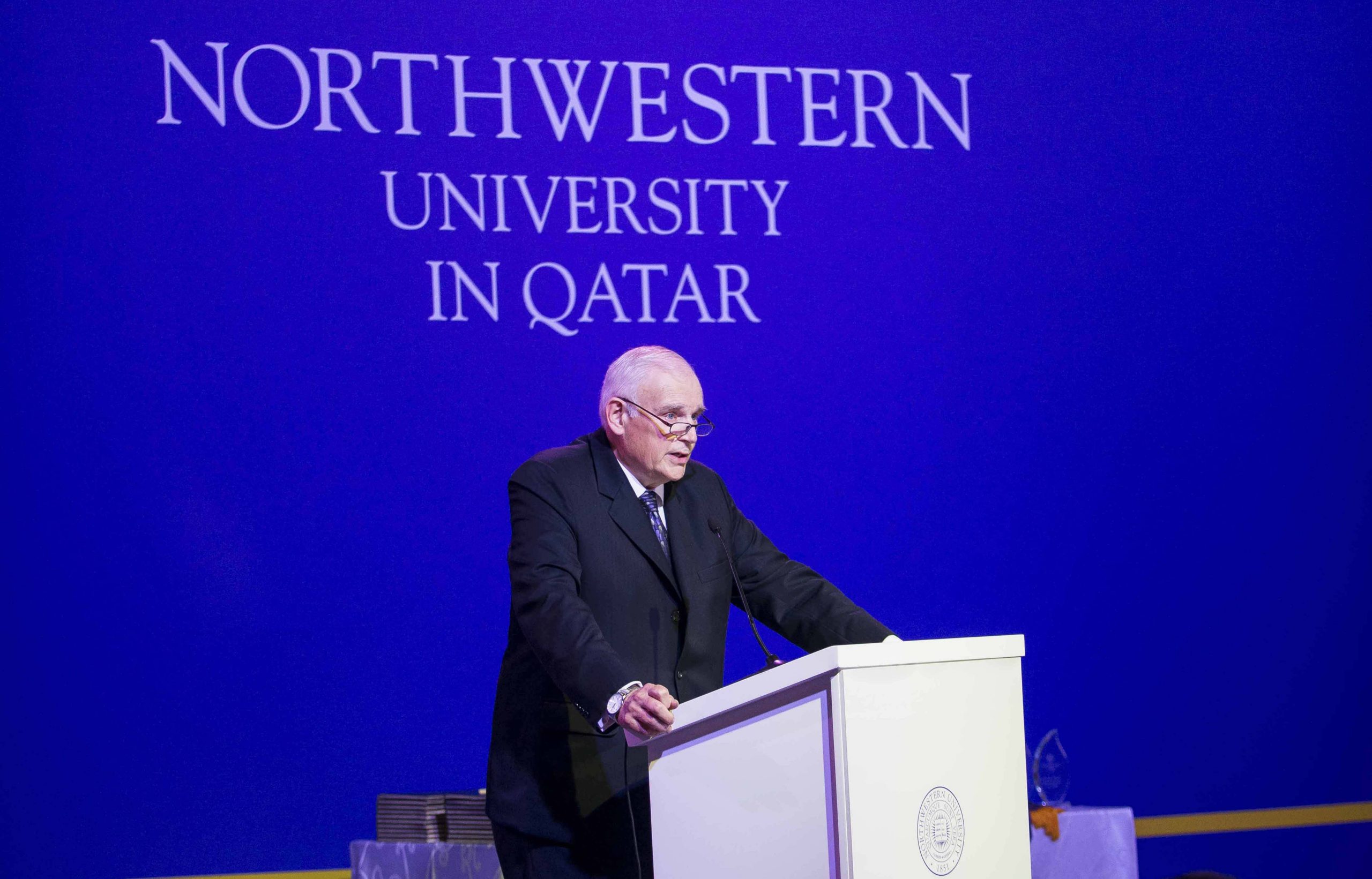
Government transparency has improved in Qatar in the eight years that Northwestern University has operated a branch campus here, but there is still work to be done, its head recently said.
In a wide-ranging interview last week, NU-Q dean and CEO Everette Dennis told Doha News that this development has coincided with more robust local news coverage, although journalists are still “measured” in most of their reporting.
“There are things being written about now … in ways that might not have taken place in the past,” he said.
NU-Q, which recently negotiated a new 10-year contract with Qatar Foundation, has long drawn scrutiny for teaching western-style journalism and communication courses in a country that’s been criticized for a lack of media freedom.

While advocacy organizations such as Reporters Without Borders say little has changed in Qatar over the past four years, Dennis disagrees.
“We’ve seen some degree of improvement in transparency in government,” he said.
“We can’t claim credit for what other people do … (but) we’ve certainly encouraged it. We’ve tried to be supportive and explain why that’s of value to the country.”
Strategy
Instead of lecturing the country’s government and business leaders about what needs to be done, Dennis said the school’s approach has been to study and produce research on attitudes toward censorship, criticism of government and other topics.
The results are then used as a way to open discussions about freedom of expression.
So far, some of that research has revealed strong local support for government bans of “offensive” content in movies and other forms of entertainment.

However, Dennis said attitudes are evolving among government officials when it comes to sharing information.
As one example, Dennis pointed to the formation of the Government Communications Office, which occasionally issues statements on hot-button issues, such as the abuse of low-income expats.
Elsewhere, the Ministry of Development Planning and Statistics started to publish monthly bulletins that contain various economic, social and government figures in January 2014. And, in a bid to improve transparency, the government announced an “open data” policy that would see it post more raw information online.

However, no new information has been released since the open data policy was announced in late 2014. And many government ministries and publicly funded organizations routinely refuse to answer questions from journalists.
However, with each academic year, more and more NU-Q graduates are finding themselves working in the communications departments of these organizations, bringing a new approach and mindset, Dennis said.
“We are producing some fantastic students who are out there working professionally,” he said.
Historically, approximately one-quarter of NU-Q students go on to pursue graduate studies, Dennis said.
Most of the remaining 75 percent stay in the region to work for media organizations such as Al Jazeera, Qatar TV and Al Arabiya in Dubai, as well as take communications positions with public relations firms, government ministries and organizations.

While some graduates are working for magazines in the region, Dennis conceded he’s “disappointed” that so few students have gone on to write for local newspapers.
In the coming years, NU-Q plans to develop graduate-level programs of its own, as well as expand its offerings to include evening and weekend executive education courses.
After the university moves into its own building during the next academic year, Dennis said he envisions the student body eventually increasing to approximately 300, up from the 207 currently enrolled.
Academic freedom
Separately, Dennis rejected criticism that the school’s professors lack academic freedom because they’re hired on fixed-term contracts and not protected by tenure.
He added that he’s not in favor of offering faculty long-term contracts, arguing the school needs the flexibility to hire staff with different skills in the rapidly changing fields of journalism and communication.
Last year, Stephen Eisenman – who was president of Northwestern’s faculty senate at the time – traveled to Qatar on a three-day visit to learn more about the American university’s campus in the Middle East.
Among his findings, outlined in a six-page report, is that NU-Q faculty have limited academic freedom:
“This is not so much because they fear they will run afoul of Qatar’s strict censorship laws, though that is a possibility, but because most are untenured and largely answerable to the NUQ dean alone,” he said.
He added that the situation is exacerbated by the connection in Qatar between one’s job and residency in the country. A faculty member whose contract is not renewed risks being forced to leave their home and community in Qatar, Eisenman wrote.
However, Dennis told Doha News that some staff members have been with NU-Q since the school was founded in 2008 and, like many faculty members, continue to have their contracts renewed.

“No one here complains about their academic freedom. People are teaching what they want to,” he said.
Dennis said it’s unlikely NU-Q faculty would ever be tenured, because it would create financial obligation for Northwestern’s home campus should NU-Q’s contract in Qatar ever expire.
He also said long-term contracts may not be in the best interest of the school:
“Journalism is a field that’s in rapid disruption,” he said. “What should the faculty even look like here in 10 or 15 years? I don’t think we know…At the same time, I want people to have security, which they do.”
Thoughts?







